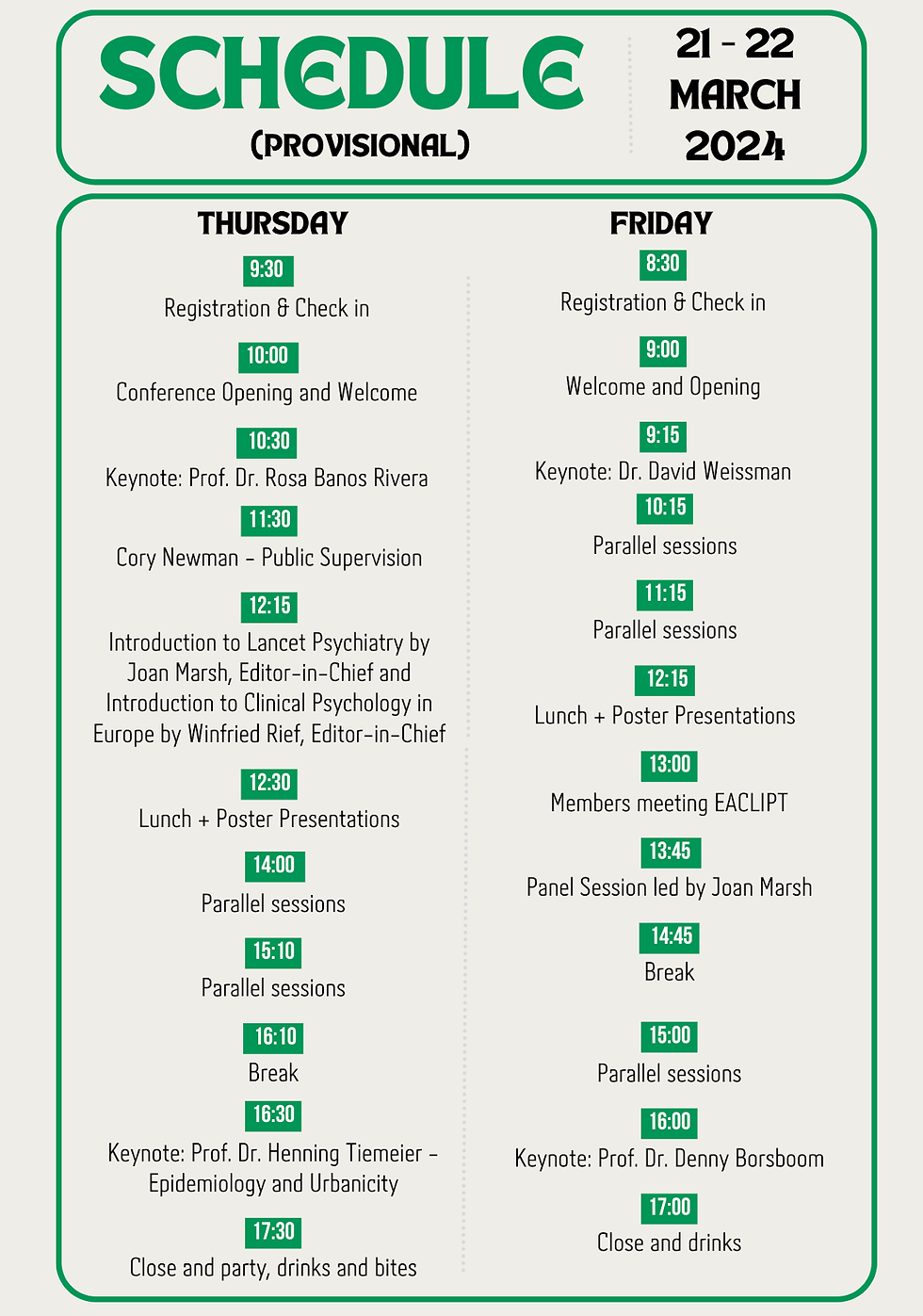EACLIPT Conference 2024 in Amsterdam | Get your tickets now!
- Oct 26, 2023
- 2 min read
Updated: Jan 2, 2024
Join us for our upcoming EACLIPT x UMH Conference on March 21st – 22nd, 2024, in Amsterdam, The Netherlands, and contribute by presenting your own research: Ticket registration is open now!
Location: Tolstuinhuis, Amsterdam, The Netherlands

For this year’s conference, EACLIPT partnered up with the Amsterdam-based Centre for Urban Mental Health to host a two-day event on the quest to help people thrive and reduce the burden of common mental disorders in a globalized and increasingly urbanized world. We are thrilled to announce our keynote speakers:
 |  |  |  |
Prof. dr. Rosa Banos Rivera | Prof. dr. Henning Tiemeier | Dr. David Weissman | Prof. dr. Denny Borsboom |
Talk: Exploring the Potential of Microinterventions to Boost Mental Health | Talk: Population Neuroscience: Research in Children and Underserved Populations that matters for Public Health | Talk: Can public policy interventions reduce inequality in neurodevelopment and mental health? | Talk: Network approaches to psychopathology: An overview and an agenda for future research |
Rosa Banos is currently Professor of Psychopathology, attached to the department of Personality, Evaluation and Psychological Treatments, and the Polibienestar Institute, University of Valencia. | Henning Tiemeier is Professor of Social and Behavioral Science and the Sumner and Esther Feldberg Chair of Maternal and Child Health at the Harvard T.H. Chan School of Public Health, as well as Professor of Psychiatric Epidemiology at the Erasmus Medical Center, Rotterdam. Henning Tiemeier received both his medical and sociological degree from the University of Bonn, Germany, and his PhD from the Erasmus University in Rotterdam, Netherlands. | David Weissman is an Assistant Professor of Psychology at California State University, Dominguez Hills. He obtained his PhD in Psychology from the University of California, Davis, and was a postdoctoral fellow at Harvard University. His research examines how childhood adversity impacts neurodevelopment in adolescence and how this manifests in risk for psychopathology. Importantly, childhood adversity occurs within the context of broader societal structures that influence who experiences adversity and the resources available to them, and Dr. Weissman has conducted pioneering work examining the role of the macrostructural context in neurodevelopment and mental health. | Denny Borsboom is Professor in the Psychological Methods Group at the Psychology Department of the University of Amsterdam and director of its Social and Behavioural Data Science Centre. His research focuses on the conceptual analysis of psychometric concepts, the development of new psychometric techniques, and the formation of formalized psychological theory. |
If you would like to join the conference as a participant, you can get your tickets here. A special student discount is available. Please be aware that this is a boutique high-class conference - tickets are highly limited and likely sold out soon, so please plan ahead in time. You can also stay up-to-date with us on Twitter and LinkedIn.

Call for Abstracts (ended): We further invite researchers and practitioners in the field of Clinical Psychology, Psychological Treatment, as well as Mental Health Research and Complexity Sciences at every level of their professional development, to actively contribute by presenting their recent research findings, insights, and evidence-based practices. Submissions spanning topics such as prevention, diagnostics, interventions, availability and delivery of psychological help, policy making, innovative methods, classifications, and evidence-based recommendations are specifically encouraged. The extended deadline for submissions is December 8th, 2023, there are four different ways to contribute:
Poster presentations: Poster presentations can report on completed studies, research in progress, or innovative ideas.
Rapid presentations: 5-minute oral presentations, including time for questions and discussion. We suggest that presentations in this format should not exceed 5 slides.
Oral research talks: 15-minute oral presentations, including time for questions and discussion.
Symposia: (Groups of) researchers who wish to be allocated into one of the sessions, based on similarity of the presented topics, are encouraged to apply for symposia.


Comments